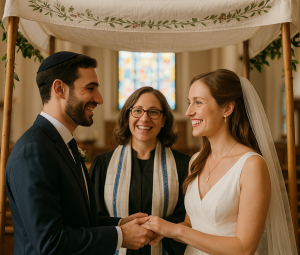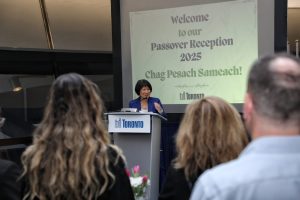 TORONTO — Cultural and ethnic diversity in and out of Israel was the topic of a panel discussion sponsored by the Haifa Foundation and the Canadian Friends of Haifa University.
TORONTO — Cultural and ethnic diversity in and out of Israel was the topic of a panel discussion sponsored by the Haifa Foundation and the Canadian Friends of Haifa University.
Rabbi Baruch Frydman-Kohl
The forum, which took place April 2 at Beth Tzedec Congregation, centred on the Israeli port city of Haifa, whose diverse population consists of Jews, Muslims, Christians, Druze, Baha’is and both Russian and Ethiopian new immigrants.
The moderator, Beth Tzedec’s spiritual leader, Rabbi Baruch Frydman-Kohl, suggested that an increasingly globalized world forces people to meet the challenge of diversity.
Haifa, where Jews and Arabs live in close proximity, exemplifies diversity, he said. In this country, the challenge is about how Canadians can acknowledge and respect diversity.
Rabbi Frydman-Kohl said that Jewish tradition is steeped in the values of diversity.
Shai Razieli, a native of Haifa who now lives in Toronto, said that Haifa’s ethnic pluralism predates the establishment of Israel.
Hassan Shukri, the Muslim mayor of Haifa during the British Mandate period, appointed a Jewish deputy, and this custom remains intact today.
“Coexistence is in our blood,” he said.
Faisal Azaiza, head of the Jewish-Arab Center at the University of Haifa and the head of the MA program at its school of social work, discussed bilingualism and bilingual education in Israel.
Azaiza, a Muslim, said that while most Israeli Arabs speak Hebrew, the majority of Israeli Jews don’t speak Arabic, yet two-thirds of Israeli Jews surveyed believe that Arabic should be a mandatory subject in Israeli schools.
Judging by surveys, Israeli Jewish high school students generally don’t think that Arabic will be of use to them in later life.
Their Arab counterparts, however, learn Hebrew for pragmatic economic reasons, Azaiza pointed out.
Israeli Jewish parents who send their children to bilingual Arabic-Hebrew schools do so to break down social barriers. Arab parents do so on the assumption that their children will be better off in Israeli society with a sound grasp of Hebrew.
Support for bilingual schools is higher among Arabs than Jews, he said.
Ken Greenberg, former director of urban design and architecture for the City of Toronto, said he was “very surprised” that most Israeli Jews don’t speak Arabic.
As ethnically homogeneous cities become a thing of the past, people will have to learn to deal with this phenomenon, he noted.
Greenberg said that while Tel Aviv looks almost as diverse as Toronto in terms of its inhabitants, it’s composed primarily of Jews and some foreign guest workers.
Siamak Hariri, a Baha’i architect based in Toronto, described Haifa as “a special city” by virtue of its status as world headquarters of the Baha’i movement.
Baha’i temples are open to all faiths and people from all walks of life, he said.
Karen Mock, president of the Canadian Friends of Haifa University and a senior policy adviser on diversity and equity to the Ontario minister of education, discussed the challenges of realizing the promises of diversity in a multicultural society.






